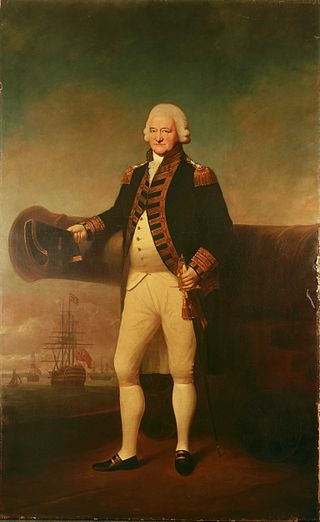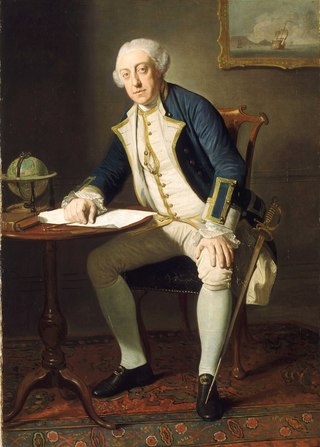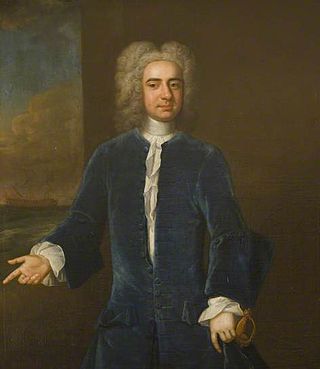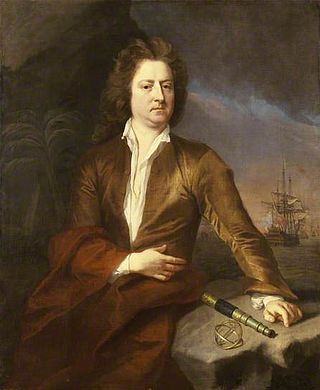
Admiral of the Fleet Sir Peter Parker, 1st Baronet was a Royal Navy officer. As a junior officer, he was deployed with a squadron under Admiral Edward Vernon to the West Indies at the start of the War of Jenkins' Ear. He saw action again at the Battle of Toulon during the War of the Austrian Succession. As captain of the fourth-rate HMS Bristol he took part in the Invasion of Guadeloupe during the Seven Years' War.

Admiral Philip Affleck was an admiral in the Royal Navy. He was the younger brother of Sir Edmund Affleck. Affleck held various commands throughout the latter half of the 18th Century, most notably as commander-in-chief of the Jamaica Station and as a Lord of the Board of Admiralty. Early in his career he fought at the Siege of Louisbourg where he was promoted commander after carrying out a successful cutting-out mission. He was promoted to post-captain a year later after impressing Admiral Edward Boscawen during the Battle of Lagos. Later in his career he joined Admiral Sir George Rodney in the West Indies and took part in the capture of Sint Eustatius. Between 1790 and 1792 he held the position of commander-in-chief of the Jamaica Station and between 1793 and 1796 he held his position as a Lord of the Board of Admiralty. Although his career was marked with long periods of inaction and unemployment Admiral Affleck was known as a good officer and was well respected by his peers.

Admiral Sir William Parker, 1st Baronet, was a British naval commander.

Admiral of the Fleet Sir Chaloner Ogle KB was a Royal Navy officer and politician. After serving as a junior officer during the Nine Years' War, a ship he was commanding was captured by three French ships off Ostend in July 1706 in an action during the War of the Spanish Succession.
Admiral The Hon. George Townshend was a British naval commander.

Vice-Admiral Sir Joshua Rowley, 1st Baronet was a Royal Navy officer who was the fourth son of Admiral Sir William Rowley. Sir Joshua was from an ancient English family, originating in Staffordshire (England) and was born on 1 May 1734. Rowley served with distinction in a number of battles throughout his career and was highly praised by his contemporaries. Unfortunately whilst his career was often active he did not have the opportunity to command any significant engagements and always followed rather than led. His achievements have therefore been eclipsed by his contemporaries such as Keppel, Hawke, Howe and Rodney. Rowley however remains one of the stalwart commanders of the wooden walls that kept Britain safe for so long.

Admiral Sir Edward William Campbell Rich Owen GCB GCH was a Royal Navy officer who went on to be Commander-in-Chief, Mediterranean Fleet. He was the son of Captain William Owen and elder brother of Vice-Admiral William Fitzwilliam Owen.

Arthur Forrest was a British officer of the Royal Navy who saw service during the War of the Austrian Succession and the Seven Years' War, rising to the rank of captain and the post of commodore. He also owned 3,000 acres of sugar plantations, and a considerable number of slaves, in the Colony of Jamaica.
Sir William Burnaby, 1st Baronet was a British naval officer who became Commander-in-Chief, Jamaica Station.
Admiral Robert Montague was a Royal Navy officer who became Commander-in-Chief of the Jamaica Station.
Vice-Admiral John Ford was a Royal Navy officer who served as Commander-in-Chief of the Jamaica Station.
Rear-Admiral Alexander Innes was a Royal Navy officer who became Commander-in-Chief of the Jamaica Station.
Vice-Admiral John Pakenham (1743–1807) was a Royal Navy officer who became Commander-in-Chief of the Jamaica Station.

Admiral William Parry was a Royal Navy officer who served as Commander-in-Chief of the Jamaica Station.
Captain Cornelius Mitchell was a Royal Navy officer who served as Commander-in-Chief of the Jamaica Station.

Vice-Admiral Thomas Davers was a Royal Navy officer who served as Commander-in-Chief of the Jamaica Station.
Captain Digby Dent (1682–1737) was a Royal Navy officer who served as Commander-in-Chief of the Jamaica Station.
Rear Admiral Edward St. Lo was a Royal Navy officer who served as Commander-in-Chief of the Jamaica Station. He may have been the son of the Commissioner of the Navy, George St. Lo.
Vice Admiral James Littleton (1668–1723) was a Royal Navy officer who served as Commander-in-Chief of the Jamaica Station.

Commodore The Hon. William Kerr was a Royal Navy officer who served as Commander-in-Chief of the Jamaica Station.









